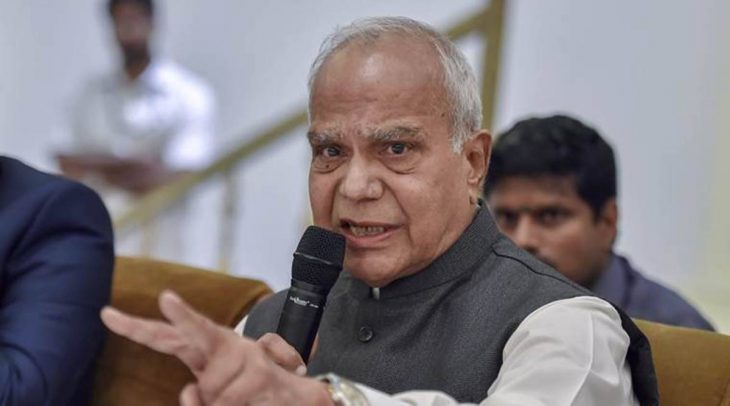The digitisation of services at the estate office encapsulates the vision of transparency, efficiency and citizen-centric services, said Chandigarh Administrator Banwarilal Purohit during the launch of online services at Hotel Mount View on Tuesday.
“The absence of digitisation had led to a non-transparent system where the applications of citizens were delayed for months together. Due to this lack of transparency, there were also allegations of corruption and various malpractices,”Banwarilal Purohit said.
Early this year, The Indian Express highlighted how it was taking years for a common man to get a basic document from the estate office. The series of stories exposed how the system worked where officials were sitting on files for years
During the launch, the administrator said, “today’s launch encapsulates the vision of transparency, efficiency and citizen-centric services. This was the vision I had laid out before the officers of the UT Administration immediately on joining here. All the officers were told to make processes simple, remove all ambiguities or anomalies, ensure proper use of technology so that citizens could avail of services seamlessly. They were also told to crack down heavily on any malpractices and bring about reforms to end any harassment of citizens. I have always believed that systemic change is a must to bring about everlasting and sustainable changes. I am happy that today’s programme is one such example where process reengineering is taking place in a public office to provide various services to the citizens in a transparent and efficient manner.”
The estate office was established in 1952 to provide various property-related services such as allotment, auction, maintenance of the record of ownership. However, most of these services were being provided through offline mode, which had several inherent limitations.
“The absence of digitisation had led to a non-transparent system where the applications of citizens were delayed for months together. The citizens had no feedback system and a very weak redressal system. Due to this lack of transparency, there were also allegations of corruption and various malpractices. In this day and age when a citizen can do most of the things sitting at home, it is surprising how only a manual system of payments was prevailing. The result of all these inefficiencies was delays, red-tapism and harassment of applicants,” Purohit added.
To overcome these problems, the Estate Office undertook this project with the help of the National Informatics Centre (NIC).
Forty teams consisting of 125 employees were deputed to digitise all property records. A master form was designed containing all the essential fields. Each property file has about 200 essential fields, which are needed for any transaction. All these fields were first uploaded by computer operators. Roughly 80 lakh entries were then verified by clerks with digital signatures. 100 per cent verification was done again at the senior assistant level and a sample verification of 10 per cent done at the superintendent level, again all with digital signatures. This has led to the building of a reliable digital database.
Applications have been developed for all services provided by the estate office and internal workflow has been changed in such a way that all the applications received will be processed online from end to end.
The citizen would be informed about the progress of his application by SMS on his phone and can also track the status by logging in. Since all the property files are being scanned, there will be no physical movement of files. All the officials in the estate office will now deal with the files through online applications only with their digital signatures. Dashboards have been developed to monitor not just the movement of files but also the performance of different officials.
In case of delays, SMS alerts will be sent to the officials also and will be reflected on the monitoring dashboard available with senior officers. Besides, this application has also been linked with applications of other services such as the sub-registrar office and State Bank of India.
“These efforts will surely transform the estate office into a technology-driven organisation that provides seamless and on-demand services to the citizens through highly efficient citizen-friendly processes. I would like to say that this is just the beginning. Every new system throws up unforeseen challenges and I am sure that this reform will also face such issues. All the officials will need to continuously monitor the progress and also innovate further, in case the need arises. I will request all the elected representatives, resident welfare associations, traders and property associations as well as the media to be an active part of this reform process and work with us in our quest for transparent and citizen-friendly administration,” Purohit added.







Leave a Reply